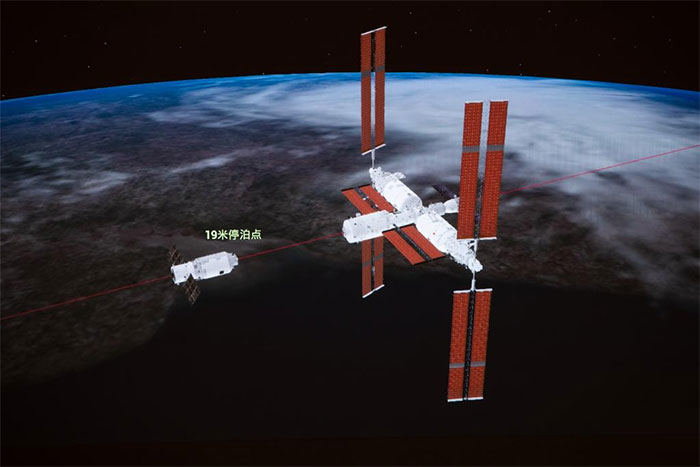China sends 'Moon bricks' into space
On November 15, China launched the Tianzhou-8 cargo ship to deliver equipment to the Tiangong space station .
According to the China Manned Space Administration, the Long March-7 rocket carrying the Tianzhou-8 spacecraft lifted off from the Wenchang Space Launch Center in the southern province of Hainan. After about 10 minutes, the Tianzhou-8 spacecraft separated from the rocket and entered its designated orbit. The spacecraft's solar panels were deployed. The China Manned Space Administration declared the launch a success.

The Tianzhou-8 spacecraft carries essential supplies for astronauts in orbit.
The Tianzhou-8 spacecraft will automatically land and dock with the rear port of the Tianhe main module of the Tiangong space station about 3 hours after launch. China's Tianzhou cargo spacecraft is 10.6 meters long and has a maximum diameter of 3.35 meters, consisting of a cargo module and a fuel module, mainly responsible for transporting supplies and fuel to the Tiangong space station and returning waste from the space station to the atmosphere for incineration and disposal.
During this mission, the Tianzhou-8 spacecraft will carry essential supplies for astronauts in orbit, including daily necessities, medical supplies, and materials to support astronauts' spacewalks. These supplies are mainly intended to support the future Shenzhou-19 and Shenzhou-20 astronauts.
Notably, the Tianzhou-8 spacecraft also carried 'lunar bricks' , created by scientists from the Huazhong University of Science and Technology (HUST). Scientists used materials simulating lunar soil brought back by the Chang'e 5 spacecraft to create bricks that are three times more durable than conventional red bricks or concrete bricks. In addition, scientists have also developed a construction method using additive manufacturing technology, also known as 3D printing technology - a process of creating objects in 3D space, in which materials are applied and formed under computer control.
Therefore, the purpose of this space mission to send 'Moon bricks' into space is to test the bricks' mechanical performance and heat resistance, as well as their ability to withstand cosmic radiation to see if they can be used to build houses on the Moon. It is expected that after the space experiment, the 'Moon bricks' will return to Earth at the end of 2025.
In addition, the Tianzhou-8 spacecraft also carries fruit flies to conduct scientific experiments in a mixed microgravity environment.
- China exposes its ambition of US $ 10,000 billion in space
- The first successful printing of brick can build a house on the Moon
- 'Living' concrete bricks can heal and reproduce on their own
- China and Europe cooperate to build a village on the Moon
- China speeds up space
- China revealed a model of spacecraft to send people to the Moon
- China sends 3 astronauts to new space station
- In 2007, China will launch satellite to explore the Moon
- He and America shook Chinese hands and built bases on the moon
- China has started producing Hang Nga 3 ships
- China will launch larger spacecraft
- China launched ships collecting specimens from the moon in 2017
 Van Allen's belt and evidence that the Apollo 11 mission to the Moon was myth
Van Allen's belt and evidence that the Apollo 11 mission to the Moon was myth The levels of civilization in the universe (Kardashev scale)
The levels of civilization in the universe (Kardashev scale) Today Mars, the sun and the Earth are aligned
Today Mars, the sun and the Earth are aligned The Amazon owner announced a secret plan to build a space base for thousands of people
The Amazon owner announced a secret plan to build a space base for thousands of people